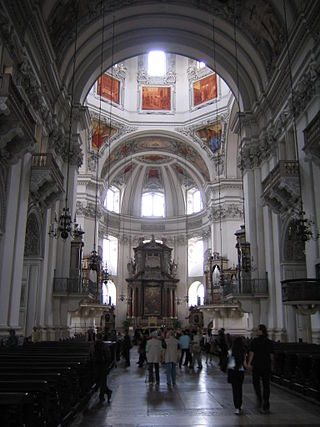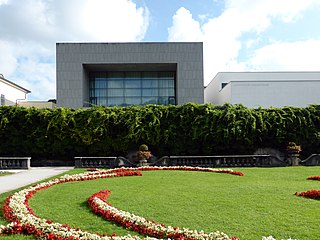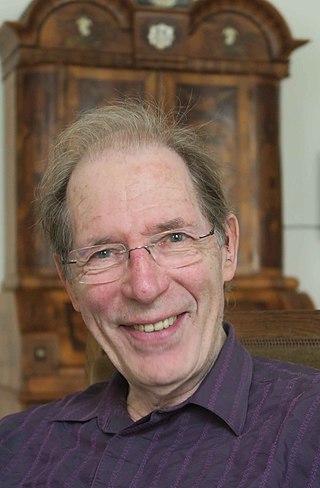
Wolfgang Amadeus Mozart was a prolific and influential composer of the Classical period. Despite his short life, his rapid pace of composition resulted in more than 800 works representing virtually every Western classical genre of his time. Many of these compositions are acknowledged as pinnacles of the symphonic, concertante, chamber, operatic, and choral repertoire. Mozart is widely regarded as one of the greatest composers in the history of Western music, with his music admired for its "melodic beauty, its formal elegance and its richness of harmony and texture".

Johann Georg Leopold Mozart was a German composer, violinist, and music theorist. He is best known today as the father and teacher of Wolfgang Amadeus Mozart, and for his violin textbook Versuch einer gründlichen Violinschule (1756).

Johann Nikolaus Harnoncourt was an Austrian conductor, known for his historically informed performances. He specialized in music of the Baroque period, but later extended his repertoire to include Classical and early Romantic works. Among his best known recordings are those of Bach, whose 193 cantatas he recorded with Gustav Leonhardt.

Robert David Levin is an American classical pianist, musicologist, and composer. He was a professor of music at Harvard University from 1994 to 2014 and the artistic director of the Sarasota Music Festival from 2007 to 2017.

The Krönungsmesse, composed in 1779, is one of the most popular of Wolfgang Amadeus Mozart's 17 extant settings of the Ordinary of the Mass. While it is relatively short, Bruce C. Macintyre, writing in the Cambridge Mozart Encyclopedia, classifies it as a Missa Longa, on the basis of the festal character, size of the orchestra, which includes a substantial brass section, orchestral introductions for the movements and the setting of the intonations for the Gloria and Credo.

Mozarteum University Salzburg is one of three affiliated but separate entities under the "Mozarteum" moniker in Salzburg municipality; the International Mozarteum Foundation and the Mozarteum Orchestra Salzburg are the other two. It specializes in music, the dramatic arts, and to a lesser degree graphic arts. Like its affiliates it was established in honour of Salzburg-born musician Wolfgang Amadeus Mozart.

Wolfgang Gratzer is an Austrian musicologist.
Dexter Edge is an American musicologist.

Mozart's birthplace is the birthplace of Wolfgang Amadeus Mozart at No. 9 Getreidegasse in Salzburg, Austria. The Mozart family resided on the third floor from 1747 to 1773. Mozart himself was born here on 27 January 1756. He was the seventh child of Leopold Mozart, who was a musician of the Salzburg Royal Chamber.

Mark Everist is a British music historian, critic and musicologist.
Simon Patrick Keefe is an English musicologist, author, and Mozart expert. Born in Leicester, he was educated at the University of Cambridge, Boston University and Columbia University. After being awarded his PhD at Columbia in 1997, he was appointed to a lectureship at Christ Church, Oxford, and then lectured at Queen's University Belfast in 1999. In 2003, he took up a post at City, University of London, where he became a professor of music. In 2008, he was appointed to the James Rossiter Hoyle Chair of Music at the University of Sheffield. As of 2024, Keefe is also serving a three-year term as president of the Royal Musical Association.
Ulrich Aloysius Konrad is a German musicologist and professor at the Institute for Music Research of the University of Würzburg. He is considered an expert on European music of the 17th to 20th centuries, especially the works of Mozart, Robert Schumann, Richard Wagner and Richard Strauss. He wrote a biography, Wolfgang Amadé Mozart, and studied the composer's sketches.

Wolfgang Rehm was a German musicologist active mostly in music publishing, especially the Neue Mozart-Ausgabe. He was on the board of its editorial team for decades, and personally edited operas and piano music. While he worked on it for Bärenreiter in Kassel, he was responsible for the program of the Kasseler Musiktage festival, and after he moved for further work to Salzburg, he shaped the program of the Mozartwoche. He was also a member of the International Association of Music Libraries, Archives and Documentation Centres from 1959 to 1985, and also a founding member and treasurer of the Répertoire International des Sources Musicales data base.

Erich Schenk was an Austrian musicologist and music historian.
Hermann Danuser is a Swiss-German musicologist.
Gerhard Croll was a German-Austrian musicologist.
Andreas Holschneider was a German music historian and writer.
Joachim Brügge is a German musicologist and composer.

Jürg Thomas Stenzl is a Swiss musicologist, and university professor.
Sarah Traubel is a German soprano in opera and concert who has performed leading roles at major opera houses and festivals. While focused on Mozart's operas, she has also performed in contemporary opera, such as Inanna in Jörg Widmann's Babylon for the opening of the 2022 Internationale Maifestspiele Wiesbaden.











